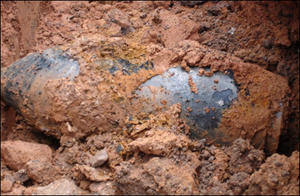Wars pastWWII bombs still plague Germany
For one bomb squad in Germany the Second World War never ended; members of Germany’s War Ordnance Disposal Service are racing against time to locate and safely defuse the hundreds of thousands of unexploded bombs dropped by Allied war planes that still litter the country

Unexploded WW II ordinance still plagues Germany // Source: blogspot.com
For one bomb squad in Germany the Second World War never ended. Members of Germany’s War Ordnance Disposal Service are racing against time to locate and safely defuse the hundreds of thousands of unexploded bombs dropped by Allied war planes that still litter the country.
An estimated two million tons of bombs were dropped over Germany by the United States, Britain, and Russia and an estimated 10 to 15 percent never exploded. Many of these bombs were designed to explode one to 144 hours after they landed to create additional havoc, but fell in a way that did not allow the fuses to work properly, which means that they are still live making them even more deadly. Colossal 550 pound and 1,110 pound bombs are routinely found and each year in the German state of Brandenburg alone roughly 350 tons of unexploded munitions is destroyed.
To help locate the bombs, the German disposal team examines old U.S. and U.K. aerial reconnaissance photos taken after bombing runs during the war. The team studies the photos to identify areas where they should search. In particular large craters with blips are often telltale signs that a heavy aerial bomb landed but never exploded.
Dangerous explosives like grenades, mortars, artillery shells, mines and aerial bomb are often found in fields or even in residential areas near homes and schools built after the war. When a bomb is located it is carefully examined and if it is judged stable enough for transport, it is taken to a central munitions storage complex.
Many of the bombs are defused using remote controlled saws, but some still have their detonator and fuses removed by hand. When twenty-five to thirty-five tons of ordnances accumulates, the facility detonates its stockpiles in a large open pit of sand.
The bomb disposal team operates on an annual budget of $18.4 million and senior team members are paid roughly $40,000 a year, despite the dangerous nature of their work which often can be fatal. Peter Ewlerlost three friends last year when a 1,100 pound exploded in Gottingen and Guido Kuschinsky, the head of the central munitions complex in Kummersdorf, lost a friend when a small device went off in the storage room.
“[My wife] makes me call after every detonation,” Kummersdorf said.
Sixty-six years after World War II, Germany is still grappling with the ravages of war and each day brings the possibility of renewed mayhem. Each passing day brings increased danger as the stabilizing agent in the bombs continues to decay making the bombs even more deadly. Some of the bombs have already begun exploding on their own resulting in wildfires that fire departments will sometimes refuse to fight for fear of larger bombs exploding.
